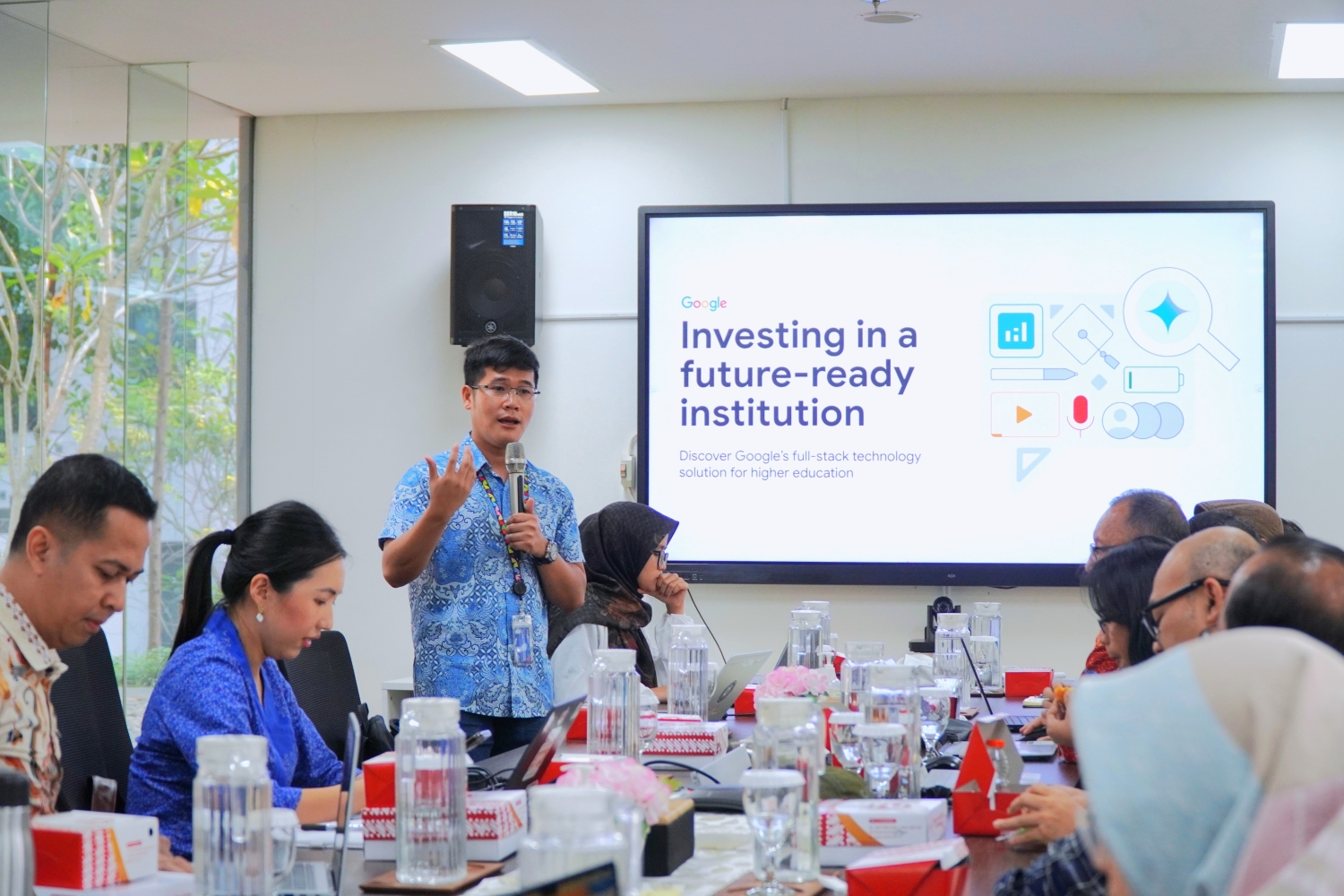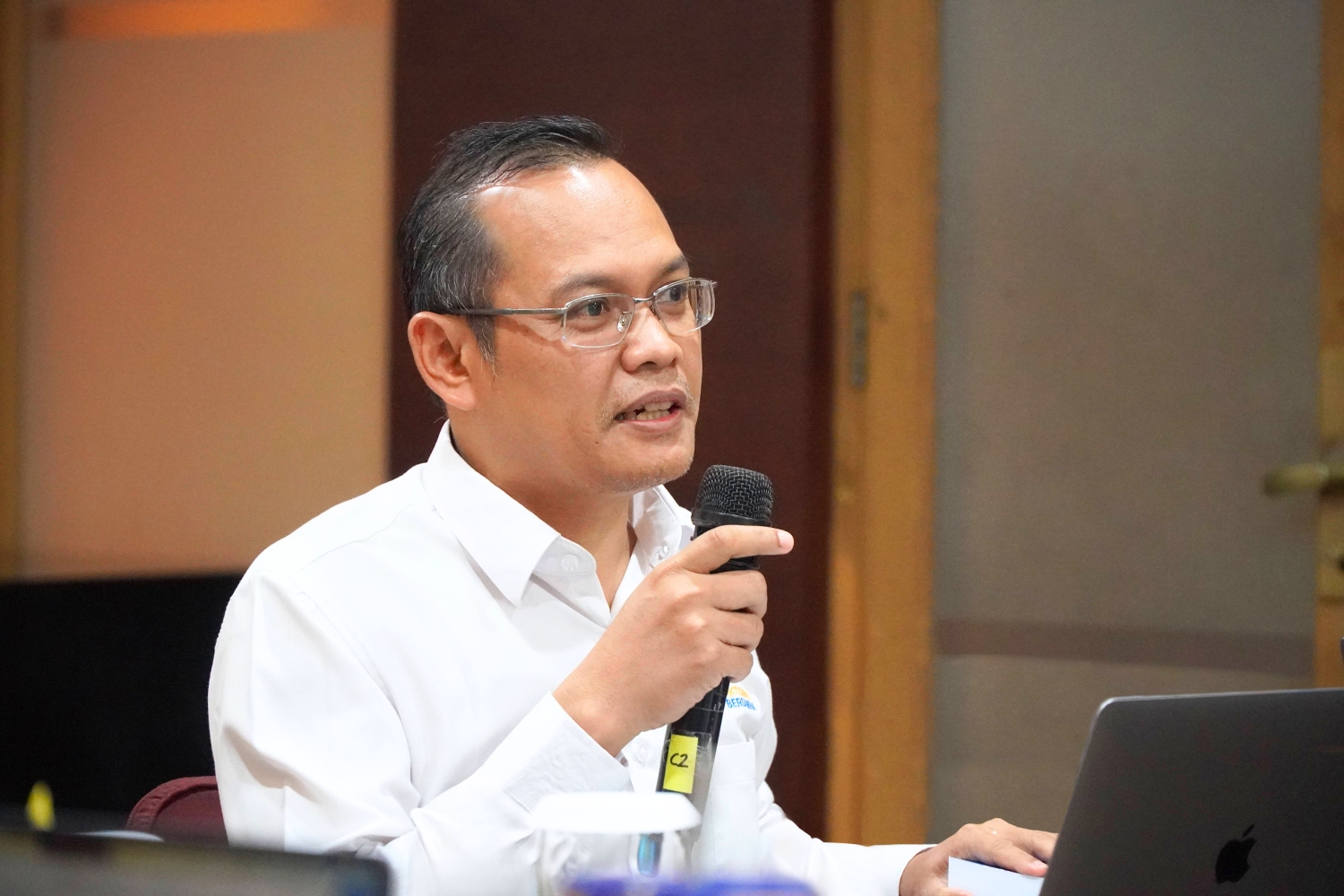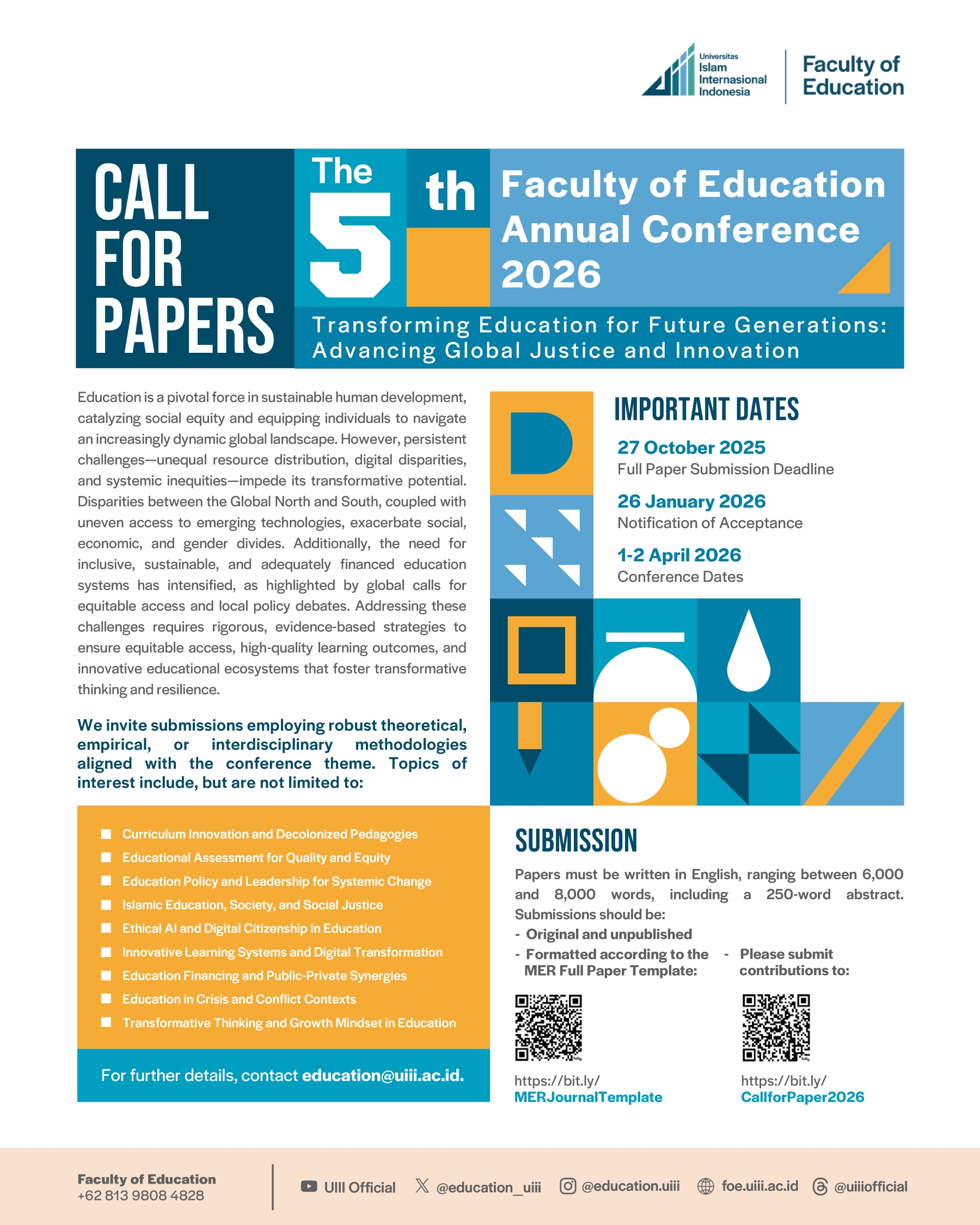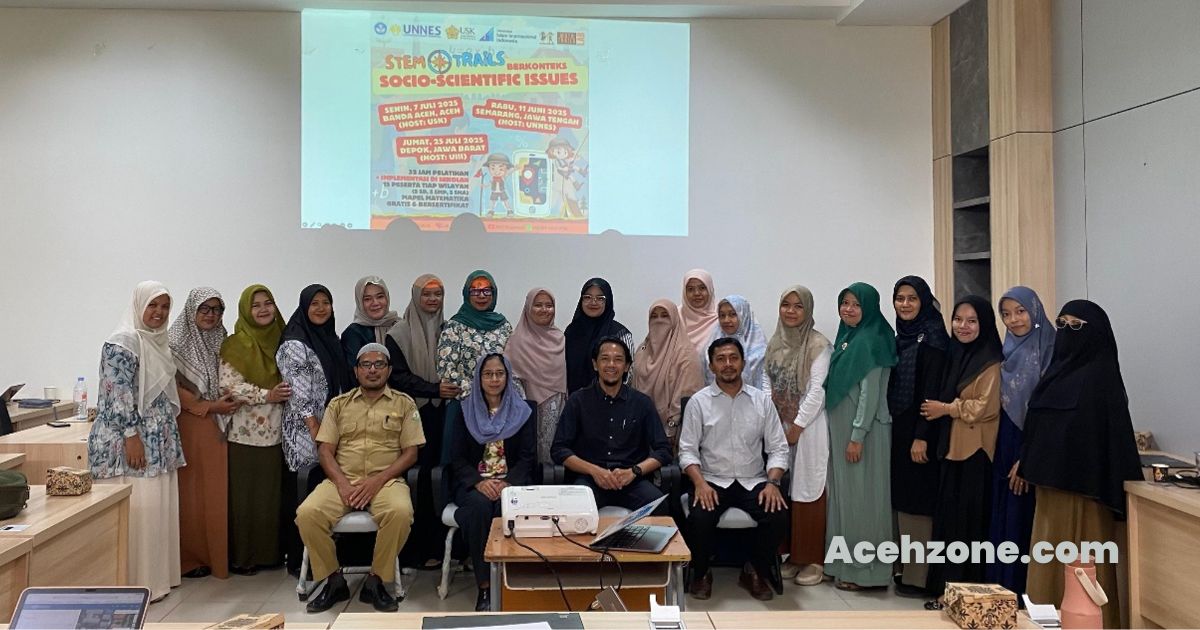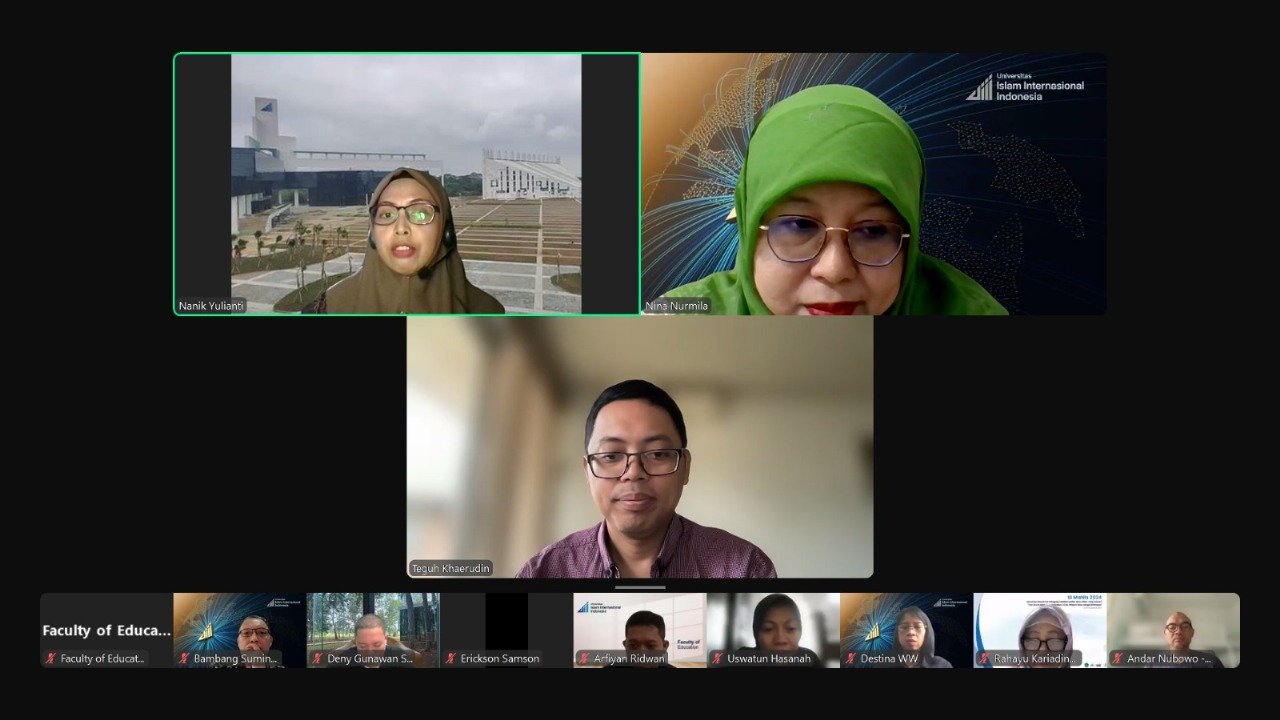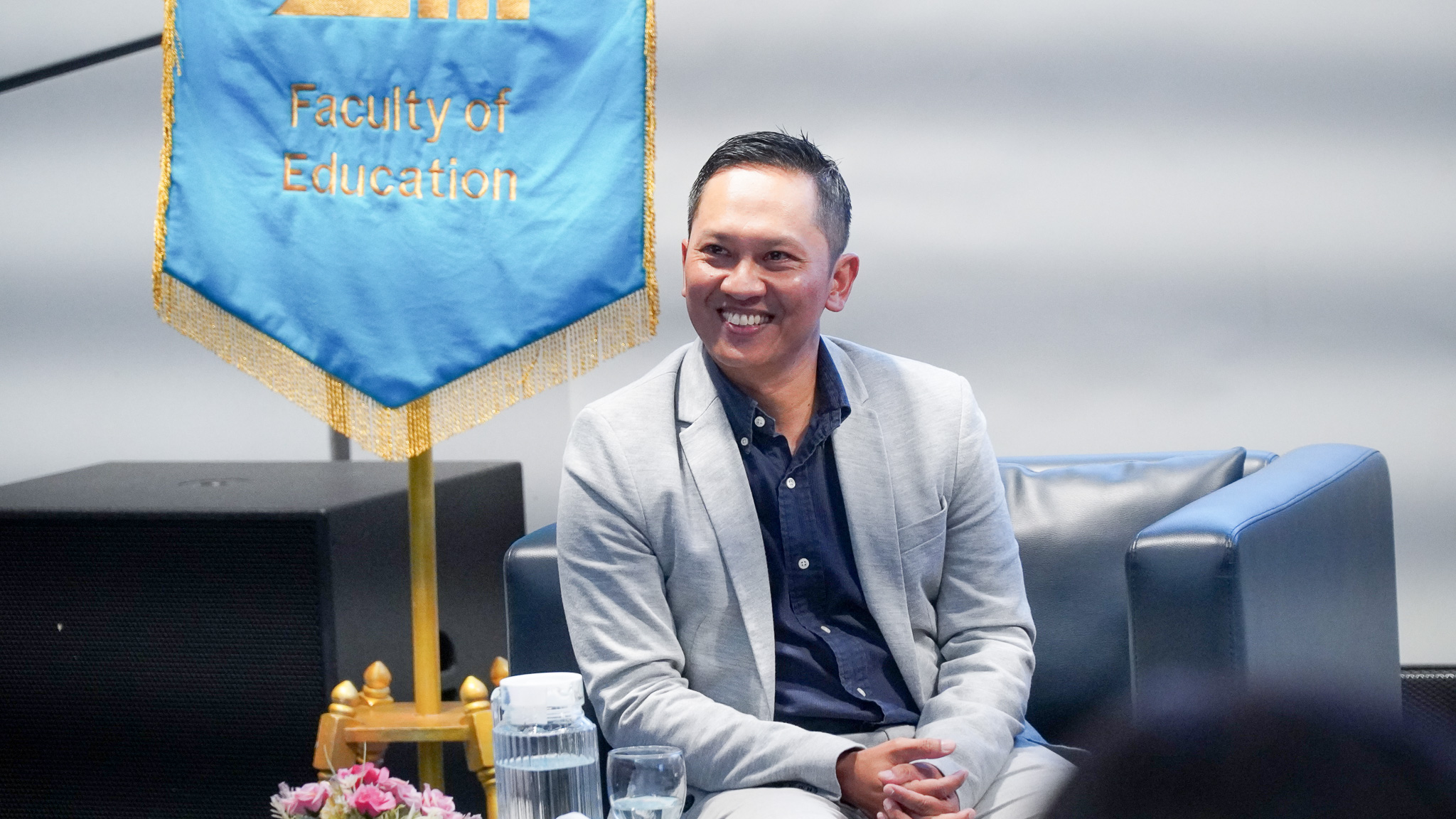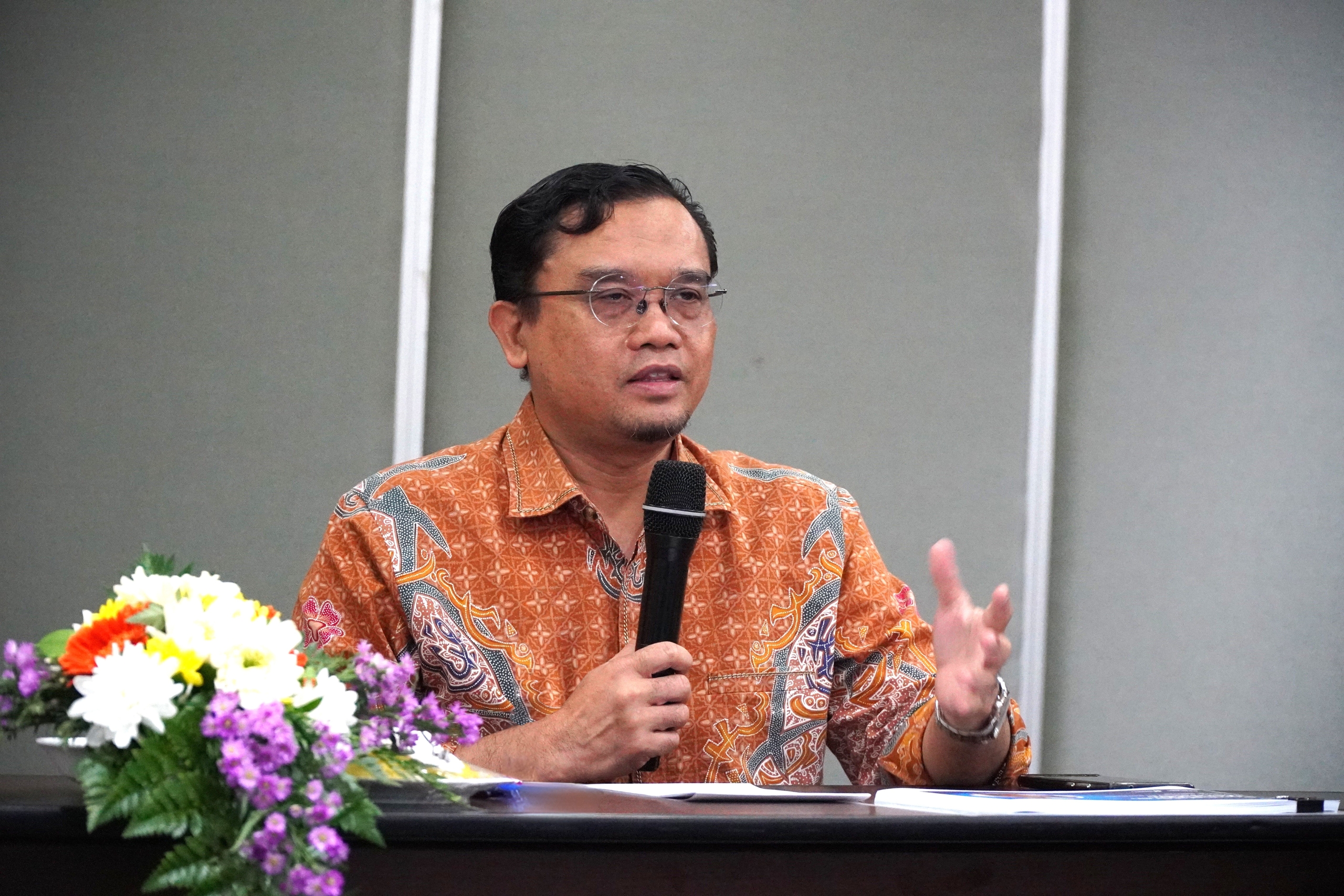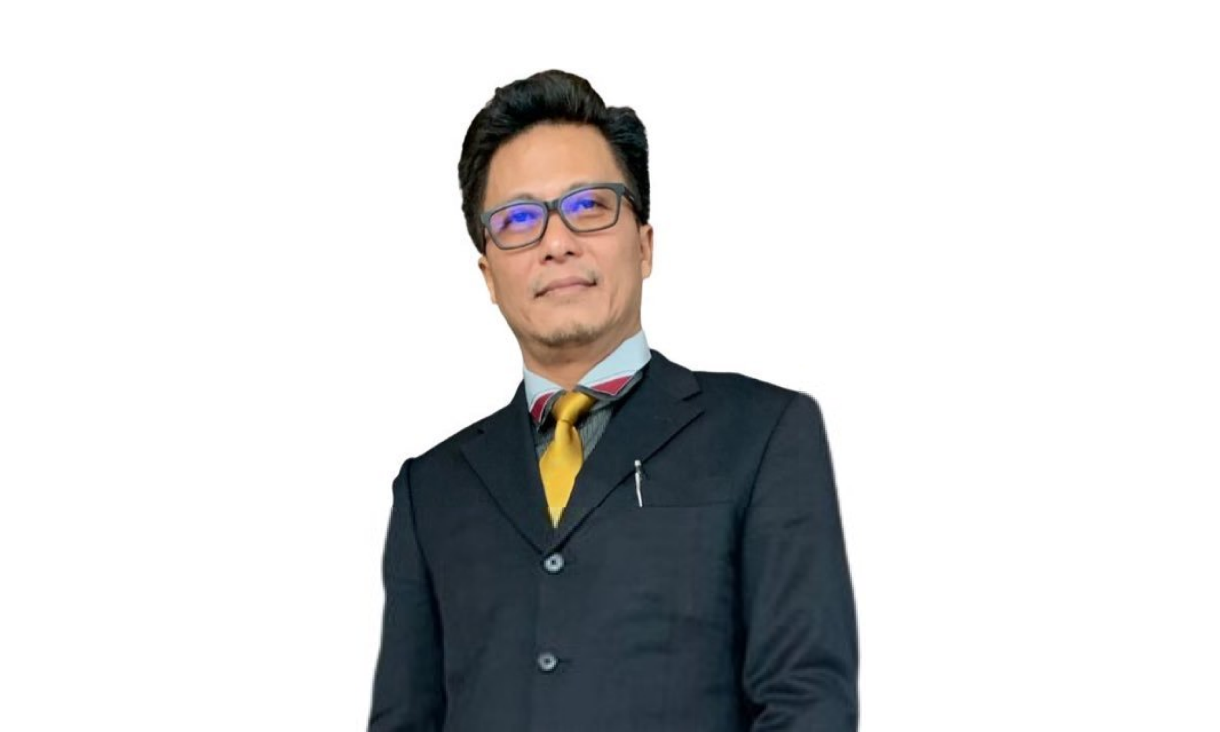Introducing the Center for Global and Transformative Education: A New Era in Educational Research at UIII
 Introducing the Center for Global and Transformative Education: A New Era in Educational Research at UIII
Introducing the Center for Global and Transformative Education: A New Era in Educational Research at UIII
Contributor & Photo by: Virda Lalitya Umam
The Faculty of Education at Universitas Islam Internasional Indonesia (UIII) proudly announced the launch of the Center for Global and Transformative Education (CGTE). The launch was officiated by Prof. Nina Nurmila, PhD, as the Dean of the Faculty of Education on August 20, 2025, coinciding with the Rethinking Accreditation Policy in Higher Education FGD event. This research center consists of seven research units, encompassing the faculty lecturers’ different areas of expertise:
- Inclusive Education Research Unit, led by Afifah Muharikah, PhD.
- Science, Technology, Engineering, Art, and Mathematics (STEAM) Research Unit, led by Dr. Destina Wahyu Winarti.
- Education Policy Research Unit, led by R. Alpha Amirrachman, PhD, and Dr. Lukman Nul Hakim.
- Literacy & Digital Storytelling Research Unit, led by Assoc. Prof. Tati Lathipatud Durriyah, PhD.
- Educational Assessment Research Unit, led by Bambang Sumintono, PhD.
- EmpathetiX Research Unit, led by Assoc. Prof. Charyna Ayu Rizkyanti, PhD.
- Islamic Education Unit, led by Prof. Muhammad Zuhdi, PhD, and Andar Nubowo, PhD.
The research center name, containing the words “Global” and “Transformative”, was not chosen on a whim either, but with careful consideration of the members’ shared ambitions. The word “global” not only refers to international perspectives and collaborations the center strives to cultivate, but also signifies that education in itself is a universal, pervasive issue, and not one that exists solely within a nation’s borders. On the other hand, the word “transformative” resonates a message that education is a force that can drive impactful, lasting changes, and that CGTE is committed to bringing those changes into fruition.

The unveiling of its logo also accompanies the launch of CGTE. The logo silhouette resembles a gear or cog, a nod to transformation, and has seven teeth, which can also be seen as seven figures, representing the seven research units. The figures appear to be overlapping or holding hands atop a globe, symbolizing that education is a collective, multifaceted endeavor. Additionally, the logo colors adhere to those of the UIII logo, being four shades of blue and green.
Considering the faculty’s size, even if it is still a small initiative in terms of quantity, CGTE aspires to create a significant impact through its diverse research endeavors and contribute meaningfully to educational discourse both locally and globally. Within the near future, the Faculty of Education hopes for this center to become a hub for collaborative, interdisciplinary research, while also serving as a platform to foster strategic partnerships for faculty and university events.

Faculty of Education Welcomes Visit from Google for Education Indonesia
 Faculty of Education Welcomes Visit from Google for Education Indonesia
Faculty of Education Welcomes Visit from Google for Education Indonesia
Contributor & Photo by: Virda Lalitya Umam
On September 23, 2025, the Faculty of Education at Universitas Islam Internasional Indonesia (UIII) welcomed representatives of Google for Education Indonesia for an engaging discussion focused on enhancing UIII’s educational practices. The visit included representatives from various divisions of Google Indonesia, who brought insights into the latest developments on their educational technologies (edtech). Moderated by resident lecturer Andar Nubowo, PhD, the aim of this meeting is to discuss the optimization of Google for Education features and explore further collaborations at the faculty and university levels.
In the introductory presentation, Kristiyanto, Adoption Lead and Customer Success, revealed that there are approximately 1,000 Google accounts with the UIII domain (uiii.ac.id), comprised of students, lecturers, staff, and administrators—less than half of the Education Fundamentals plan’s designated quota of 2,500. As UIII is already subscribed to the Education Plus plan, users with the UIII domain have access to premium features within an integrated workspace, including comprehensive edtech applications, advanced cybersecurity, and premium artificial intelligence (AI)-driven tools. However, they have yet to be utilized optimally, as many civitates are not aware of them. Additionally, since this subscription has been ongoing since the first cohort in 2021, faculty members were surprised to learn that the Education Plus plan, along with its additional perks, is set to expire within mere months.
To elaborate further on the AI aspect, Sales Program Manager Tiffany Santosa shared recent developments of the AI assistant Gemini and the research tool NotebookLM. Gemini, available as a standalone application and across various Google Workspace applications, including Google Docs, Sheets, and Meet, among others, provides assistance with writing, organizing, analyzing, and data visualization. On the other hand, the NotebookLM app, also powered by Gemini, can instantly process and produce various customizable media, ranging from videos, mind maps, flashcards, to quizzes, sourced directly from uploaded files and selected online sources. This enables educators to create interactive media efficiently, supporting learning and teaching activities. Additionally, considering Google owns the entire AI tech stack, including software, models, and cloud infrastructure, these tools can provide a tailored educational experience for teachers and students. Their seamless integration also enables continuous improvement and development by Google.
Following the presentation, Google representatives conducted a hands-on trial run of NotebookLM for the faculty members. Drawing inspiration from the prior LunchTalk session from lecturer Afifah Muharikah, PhD, Kristiyanto demonstrated NoteBookLM’s capabilities by generating an informative sample video on neurodivergence, complete with narrations, subtitles, and supporting imagery. Despite only relying on online sources with no self-uploaded files, the contents within the generated video were proven to be verifiable, as confirmed by Dr. Muharikah herself. The demonstration continued with another NotebookLM-generated quiz on Mitsuo Nakamura, a Japanese scholar on Islam, per Dr. Nubowo’s request, with lecturers then following suit to craft their own AI-powered media.
The meeting concluded with discussions on potential partnerships between the Faculty of Education and Google Indonesia, particularly for the 5th Annual Conference in 2026. The Google team showed great enthusiasm for this invitation, while also stating interest in organizing another follow-up visit and meeting the then-absent Dean Prof. Nina Nurmila, as well as central figures from the UIII Rectorate. Through this visit, the Faculty of Education is committed to fostering the finest generation of future scholars, with the help of state-of-the-art tech ecosystems and vital multisector collaboration.

Advancing STEM Education in Indonesia: Strategies for Impactful Higher Education
Advancing STEM Education in Indonesia: Strategies for Impactful Higher Education
 Contributor & Photo by: Virda Lalitya Umam
Contributor & Photo by: Virda Lalitya Umam
The last few years have witnessed a surge in technological advancements, among them augmented and virtual reality (AR/VR), next-generation connectivity (5G), and, most notably, artificial intelligence (AI) and machine learning. This growth, in turn, has had a massive, multisectoral impact on a global scale, including Indonesia, prompting governments to adapt to this era of technology. Despite that, the Ministry of National Development Planning (Bappenas) once reported that in 2023, STEM graduates made up only 18.47% of all higher education graduates in Indonesia. This number is still significantly lower than that of our neighboring countries, such as Malaysia (37.19%), Singapore (34.30%), and India (31.41%).
With these issues at hand and an upcoming semester to plan, on September 3, 2025, the Faculty of Education once again held a Semester Preparation Workshop as a means to synergize future teaching activities and gain insights into various topics surrounding education. This opportunity saw Prof. Ahmad Najib Burhani, PhD, Director General of Science and Technology at the Ministry of Higher Education, Science, and Technology, as the speaker. His presentation, titled Policies on Science and Technology in Indonesian Higher Education, explores how the push for STEM education and its supporting policies embody impactful higher education.
Kicking off the workshop, Prof. Burhani identified problems regarding STEM education in Indonesia, ranging from unequal quality and unintegrated curricula to the lack of trained educators and interest, as well as of literacy. The strategies laid out by the Ministry of Higher Education, Science, and Technology boil down to three points: building scientific culture, scientific temper, and scientific solutions. These strategies would then be incorporated into STEM education and implemented in real-world practices.
From a helicopter view, the current paradigm of STEM applications in Indonesia differs quite strikingly from the past. In the late 20th century up to the post-Reformation era, the government focused on high-tech, with notable inventions such as the Palapa satellites and the N250 Gatotkaca airplane coming to mind. In the 2010s, the attention shifted to public transportation, highway construction, and other public infrastructures. Now, as revealed by Prof. Burhani, the government mainly has eyes on eight priority programs known as Asta Cita—food security, energy, defense, digitalization, health, industrialization, maritime, and manufacturing—with emphasis on improving and optimizing the technology we already have.
From Prof. Burhani, we identify three main subjects of sci-tech policies by the Directorate General of Science and Technology: students, as recipients and users of STEM knowledge; teachers, as implementers of transformative education strategies, and; dissemination of science, from basic scientific literacy, to the public understanding of science, and the end goal of public engagement with science and technology. Additionally, another notable adjustment the government has made is the reallocation of education endowment funds (LPDP), allotting 80% for STEM research, scholarships, and education starting in 2026. Of course, exceptions are made, particularly for underdeveloped areas with more urgent priorities, of which a moratorium is implemented.
Looking at the big picture, if Indonesia, at one point, crafted satellites and planes, does this mean we experienced a technological downgrade since then? According to Prof. Burhani, this isn’t necessarily the case. As previously mentioned, while the focus of high-tech breakthroughs is no longer the limelight, science and technology are fundamentally expressions of culture—the two are not separable. To place greater care and attention toward existing tech does not necessarily mean forsaking modern creativity. Around us, we can also find various micro-level inventions emerging on the regular, coined as ethnotechnology, which he drew parallels with basic and applied research: applied research is only ever possible if we have the nitty-gritty, basic research in place. To quote Prof. Burhani, the highest technological achievements would bear little significance if the people cannot understand their value or feel their benefits.
Now, what does all this mean for higher education institutions in Indonesia? What can we do to not fall behind, especially in STEM-based fields? For starters, strengthen research related to fields that Indonesia is a home to and aren’t far-fetched from our vicinity (e.g., tropical medicine, biodiversity, oceanography, etc). Additionally, based on our recent FGD, a single institution does not need to specialize in every field and its concentrations; instead, it can focus on specific areas of expertise unique to the region, while collaborating with other institutions to provide comprehensive education and research. Most importantly, how we communicate and disseminate knowledge is crucial to grow public interest and broaden access to science, or as Prof. Burhani puts it, to become a friend to science.

Call for Papers: The 5th Faculty of Education Annual Conference 2026
 Call for Papers: The 5th Faculty of Education Annual Conference 2026
Call for Papers: The 5th Faculty of Education Annual Conference 2026
Transforming Education for Future Generations: Advancing Global Justice and Innovation
Education is a pivotal force in sustainable human development, catalyzing social equity and equipping individuals to navigate an increasingly dynamic global landscape. However, persistent challenges—unequal resource distribution, digital disparities, and systemic inequities—impede its transformative potential. Disparities between the Global North and South, coupled with uneven access to emerging technologies, exacerbate social, economic, and gender divides. Additionally, the need for inclusive, sustainable, and adequately financed education systems has intensified, as highlighted by global calls for equitable access and local policy debates. Addressing these challenges requires rigorous, evidence-based strategies to ensure equitable access, high-quality learning outcomes, and innovative educational ecosystems that foster transformative thinking and resilience.
The Faculty of Education at Universitas Islam Internasional Indonesia (UIII) invites scholars, policymakers, educators, and researchers to submit abstracts and papers for the 5th Annual Conference, to be held in 2026, under the theme "Transforming Education for Future Generations: Advancing Global Justice and Innovation." This two-day hybrid conference will serve as a global platform for interdisciplinary dialogue, empirical research, and policy-relevant solutions, drawing on UIII’s Faculty of Education concentrations: Curriculum, Teaching, and Learning; Educational Assessment and Evaluation; Education Policy, Management, and Leadership; and Education and Society. The conference aims to address pressing challenges in global education, from ethical AI integration to fostering growth mindsets and equitable financing.
We invite submissions employing robust theoretical, empirical, or interdisciplinary methodologies aligned with the conference theme. Topics of interest include, but are not limited to:
- Curriculum Innovation and Decolonized Pedagogies: Designing inclusive curricula and teaching practices that integrate diverse cultural, historical, and Islamic perspectives to foster equitable, innovative, and deep learning environments.
- Educational Assessment for Quality and Equity: Advancing evidence-based assessment and evaluation methodologies to ensure high-quality, inclusive learning outcomes, particularly for diverse and marginalized groups.
- Education Policy and Leadership for Systemic Change: Formulating policies and leadership strategies to promote global partnerships, sustainable financing, and resilient education systems, linked to the Education Policy, Management, and Leadership concentration.
- Islamic Education, Society, and Social Justice: Investigating education’s role in promoting social cohesion, civic engagement, and equitable access for girls, boys, and disadvantaged groups, especially in conflict-affected regions.
- Ethical AI and Digital Citizenship in Education: Leveraging artificial intelligence and digital technologies to enhance learning while addressing ethical challenges, algorithmic biases, and access disparities.
- Innovative Learning Systems and Digital Transformation: Developing hybrid, lifelong, and technology-enabled learning ecosystems to shift paradigms from traditional schooling to flexible, inclusive learning.
- Education Financing and Public-Private Synergies: Creating sustainable funding models through public-private partnerships to support free education mandates and strengthen school ecosystems, particularly in underserved areas.
- Education in Crisis and Conflict Contexts: Ensuring children’s right to education in times of conflict and displacement through resilient school ecosystems and global partnerships.
- Transformative Thinking and Growth Mindset in Education: Fostering resilience, adaptability, and innovative thinking in learners and educators through evidence-based pedagogical and policy interventions to promote lifelong learning and equitable educational outcomes.
Submission Guidelines
Papers must be written in English, ranging between 6,000 and 8,000 words, including a 250-word abstract. Submissions should be:
- Original and unpublished
- Formatted according to the MER Full Paper Template:
https://bit.ly/MERJournalTemplate
Please submit contributions to: https://bit.ly/CallforPaper2026
Important Dates
- Full Paper Submission Deadline: 27 October 2025
- Notification of Acceptance: 26 January 2026
- Conference Dates: 1-2 April 2026
This conference is free of charge. However, participants are expected to cover their own travel and accommodation expenses. For affordable on-campus accommodation, please contact: +62 812-8000-6307 (Direktorat Pengembangan Usaha UIII)
Collaboration of Three Campuses Brings Forth STEM Trails in Aceh
 Collaboration of Three Campuses Brings Forth STEM Trails in Aceh
Collaboration of Three Campuses Brings Forth STEM Trails in Aceh
Banda Aceh (7/7/2025)—An innovative educational training program under the name STEM Trails with Socio-Scientific Issues was successfully held in Banda Aceh on Monday, July 7, 2025. This event was born from a collaboration between Universitas Syiah Kuala (USK), Universitas Negeri Semarang (UNNES), Universitas Islam Internasional Indonesia (UIII), and Math Trails Lab as part of the Indonesian Collaborative Research (Riset Kolaborasi Indonesia) program.
This training program, attended by elementary, middle, and high school teachers from various regions of Aceh, aims to provide educators with in-depth STEM teaching skills. Participants were supplied with 32 hours’ worth of materials, discussions, and hands-on implementation in their respective schools—all free of charge.
Three speakers were invited to facilitate this training session: Prof. Mailizar (USK) on STEM Learning, Dr. Adi Nur Cahyono (UNNES) on the concept of Math Trails, and Dr. Destina Wahyu Winarti (UIII) on integrating socio-scientific issues into learning.
Participants weren’t just passive recipients in this training, as they were also assigned to create and implement Math Trails in schools, which would then be documented into MathCityMap, a GPS-based educational application. Through this approach, mathematics is no longer a mere number-centered concept, but also a relevant, real-world experience.
This event is an endeavor to strengthen national-level synergy in developing a relevant and engaging educational framework that encourages critical thinking through deep learning. Banda Aceh serves as the first point in a series of national trainings, which will be continued in Semarang and Depok on later dates.
Organizing parties hope that this event can become a catalyst for educational transformation in Aceh as well as Indonesia. This cross-sector collaboration is expected to continue through mentoring, further research, and development of STEM-based learning models that can adapt to the ebbs and flows of time.
Teachers Teaching Themselves: Is It the End of Teacher’s Formal Development Program?
 Teachers Teaching Themselves: Is It the End of Teachers' Formal Development Program?
Teachers Teaching Themselves: Is It the End of Teachers' Formal Development Program?
April 24, 2025
Contributor: Virda Lalitya Umam | Editor: Supriyono | Photo: Afra Fahira
In a time when conventional professional development programs often fall out of sync with digital transformation, Indonesian teachers are finding a new way in improving their competencies—through their smartphones. This was the key insight imparted by Dr. Teguh Khaerudin at the 39th Lunch Talk hosted online by the UIII Faculty of Education on March 25, 2025.
Under the title "Empowering EFL Teachers: How Emerging Technologies Drive Informal Learning," the UIN Syarif Hidayatullah Jakarta lecturer gave insights into how informal learning is shifting and reshaping the professional development journey of EFL (English as a Foreign Language) teachers in Indonesia.
The insight was drawn from a qualitative case study—part of his PhD research project, sampling eight Indonesian EFL teachers throughout the COVID-19 pandemic. Initially, Dr. Khaerudin's research aimed to uncover how teachers utilize informal digital learning to integrate technology into their teaching practices.
However, the findings revealed a broader narrative: ‘digital content platforms, social media groups, and online webinars emerged as the primary sources of professional learning for these teachers’. These tools, he said, helped them overcome challenges posed by geography, lack of institutional support, and even poor internet access.
Among the platforms used, WhatsApp and YouTube stood out as some of the most impactful. WhatsApp facilitated peer consultations and brought together teaching communities—playing a pivotal role in building networks, especially in rural regions. Teachers connected through group chats to exchange lesson plans, troubleshoot technical problems, and share resources during lockdowns.
YouTube, on the other hand, was the go-to for step-by-step learning. Teachers didn't just to learn how to use educational software but also to explore new pedagogical techniques, design engaging materials, and even create their own instructional videos.
As such, these learning strategies cover a broad area, which Dr. Khaerudin categorized as collaborative and independent Informal Teacher Learning (ITL). However, a critical question emerged: Can such informal learning initiatives replace the formal professional development (PD) program? Despite their significance, Dr. Khaerudin argued that ITL is not a substitute for formal professional development (PD), but rather a valuable complement to it.
“While many formal PD programs are rigid, overly broad, and one-size-fits-all, Informal Teacher Learning (ITL) is self-paced, responsive to needs, and tailored to each teacher's environment,” Dr. Khaerudin said. “Informal learning fills the gap between training and practice, allowing educators to adapt quickly, explore new ideas, and reflect on what works.”
Hence, Dr. Khaerudin highlighted the significant implications of ITL, urging the stakeholders to integrate them into formal professional development frameworks, invest in adequate digital infrastructure, support teacher-led communities, and foster a learning culture for educators and learners alike. He also called for further research into how digital tools can be optimized for sustainable, high-quality learning.
He, though, warned that digital platforms are not absent from challenges. Issues such as misinformation and content overload can hinder the learning process, which in turn emphasizes the need for digital literacy and critical evaluation skills.
Dr. Khaerudin’s suggestions resonate deeply with UIII’s mission to foster educational advancement through cutting-edge research and technological innovation. By promoting adaptive, self-directed learning models and encouraging the use of emerging digital tools, his suggestions mirror UIII’s commitment to empowering educators and learners alike in navigating the evolving landscape of 21st-century education.
Kindergarten in Lockdown: How Do Leaders Kept Learning Alive?
 Kindergarten in Lockdown: How Do Leaders Kept Learning Alive?
Kindergarten in Lockdown: How Do Leaders Kept Learning Alive?
April 8, 2025
Contributor: Virda Lalitya Umam | Editor: Supriyono | Photo: Nurul Fatimah
Continuing its commitment to fostering scholarly discussions, the Faculty of Education at Universitas Islam Internasional Indonesia (UIII) hosted its 38th LunchTalk on Tuesday, February 25, 2025. This session featured Yohan Rubiyantoro, Ph.D. from the Ministry of Primary and Secondary Education, who presented his research on how kindergarten leaders adapted to the unprecedented challenges of distance learning during the COVID-19 crisis.
In his presentation, titled ‘Case Studies of School Resilience: Kindergarten Leadership During Crisis’, Dr. Rubiyantoro highlighted the pivotal role of early childhood education leaders in ensuring learning continuity amid disruptions. He began by outlining Indonesia’s education system, emphasizing the structured yet decentralized framework that places school principals at the forefront of crisis management.
Dr. Rubiyantoro’s study focused on four public kindergartens across different regions of Indonesia, examining how school leaders, teachers, and parents navigated the abrupt shift to remote learning from September to December 2021. The findings underscored significant challenges, including limited digital literacy among teachers and students, inadequate ICT infrastructure, and socio-economic disparities affecting access to online education.
The study revealed varied responses across regions. In eastern Indonesia, many kindergartens struggled with poor internet connectivity and teachers unfamiliar with digital tools, making distance learning nearly impossible. In contrast, some schools in western Indonesia discreetly continued in-person learning, citing concerns over young children’s ability to engage with virtual lessons.
In Jakarta, rapid adaptation was evident as teachers were trained to use digital platforms and create engaging video lessons. Meanwhile, in central Indonesia, schools leaned on strong community support, collaborating with parents to develop alternative learning strategies, including home-based activities and shared educational resources.
Dr. Rubiyantoro emphasized that the success of kindergarten leaders during this crisis hinged on their ability to adapt, communicate effectively with teachers and parents, and embrace digital learning. He advocated for improved crisis management training and investment in ICT infrastructure to better equip schools for future disruptions.
As Indonesia advances in digital transformation, Dr. Rubiyantoro’s insights underscore the importance of resilient and innovative leadership in early childhood education. Through this LunchTalk session, UIII’s Faculty of Education reaffirms its dedication to preparing future educational leaders to navigate uncertainties and shape a more inclusive and adaptable learning landscape.

Revolutionizing Learning: Indonesia’s Bold Step Towards High-Order Thinking
 Revolutionizing Learning: Indonesia’s Bold Step Towards High-Order Thinking
Revolutionizing Learning: Indonesia’s Bold Step Towards High-Order Thinking
Contributor: Virda Lalitya Umam
In the recent aftermath of the COVID-19 pandemic, Indonesia’s education system is once again put to the test. Findings in Indonesia’s 2022 PISA (Programme for International Student Assessment) result indicate that less than 1% of Indonesia’s students are capable of answering high-order thinking skill (HOTS) questions. Addressing these concerns, Gogot Suharwoto, M.Ed., Ph.D., Director General of Early Childhood Education, Primary Education, and Secondary Education at the Ministry of Primary Education and Secondary Education asserts the need for a revolutionary approach to educational reform.
At a semester preparation workshop held by the UIII Faculty of Education on February 19, 2025, Dr. Suharwoto explores the concept of deep learning and its implementation in Indonesian education. Alongside the worrying literacy and numeracy levels of Indonesian students, persisting educational inequality exists that the looming 2045 demographic bonus could potentially worsen. In response to these dire issues, the government formulated an approach coined as Pembelajaran Mendalam (PM)—an Indonesian take on deep learning.
PM is an approach that aims to honor knowledge, students, and teachers. PM emphasizes a learning atmosphere and process that is mindful, meaningful, and joyful through holistic and integrated cultivating of ethics (olah hati), literacy (olah pikir), aesthetics (olah karsa), dan kinesthetics (olah raga). PM is not considered a standalone curriculum in itself—it complements educational approaches by adding characteristics of pedagogical practices. Moreover, although pembelajaran mendalam is a direct translation of the term “deep learning,” Dr. Suharwoto advises the audience not to use the two interchangeably, as PM is an official, technical term unique to Indonesia, as opposed to deep learning still being a concept with broad interpretations.
The PM framework is built on four pillars. Firstly, eight core characteristics that are instilled within students. Second, learning principles of PM, being mindful, meaningful, and joyful. Third, learning experiences that students should undergo, from understanding and applying to reflecting. Lastly, pedagogical practices, learning partnerships, learning environments, and digital utilization as a learning framework for instructional designs.
Dr. Suharwoto then explains that transforming educators’ roles would also be imperative to the projected implementation of PM. The current paradigm is still top-down, with the central government formulating policies to be adapted by local governments, adopted by school principals, and implemented by teachers. The stance taken by PM is that educational policies should be more centralized on the teachers since they observe the real-time implementation of such policies on a micro-scale. Recommendations from teachers would be submitted to the school principal and then forwarded to local and central governments, respectively. This format also places educators not just as mere educators but also as activators, collaborators, and cultivators of learning culture.
Although a structured learning approach might seem overly complicated for young children, Dr. Suharwoto states that with appropriate methods, PM can be implemented from an early age. For example, in early childhood education (i.e. PAUD in Indonesia), PM can take form in hands-on, play-based learning experiences, transitioning into various interdisciplinary connections that become increasingly advanced as students age. It is also worth noting that the implementation of PM is not exclusive to conventional schools, as it can be tailored for vocational studies as well as special needs education.
By creating dynamic and inclusive education, Pembelajaran Mendalam aims to equip students with the 21st-century skills necessary to traverse an uncertain future. The topic presented by Dr. Suharwoto also strikes a resemblance to a past seminar at the Faculty of Education, which featured Dr. Berry Juliandi, M.Si of the Ministry of Higher Education, Science, and Technology. Both speakers share the same sentiment—a transformational stance in Indonesia’s education is urgently needed for the future. Through this workshop, the Faculty of Education affirms its commitment to providing educators and students alike with innovative teaching strategies and inclusive learning environments.
Filling Cybersecurity Education Gap in Primary and Secondary Schools

Filling Cybersecurity Education Gap in Primary and Secondary Schools
R. Alpha Amirrachman, PhD, Ervan Yudi Widyarto, S. Kom, M. Kom.
A recent tragedy in Palembang, South Sumatra, highlighted the dangers of online interactions, with a young girl lured by four boys via social media and subsequently assaulted. Dr. Amirrachman and Widyarto state that cases like this are no longer uncommon, as studies in Malaysia show that nearly 80% of similar cases involve minors initially connecting with strangers online. Predators often use fake identities to manipulate victims, revealing a concerning trend in digital crime.
These cases demonstrate that cyber threats now extend beyond financial or political domains, affecting individual safety, particularly the youth. However, the authors state that cybersecurity education in Indonesia is still largely exclusive to higher education. Primary and secondary students, despite inherent familiarity and interest in digital technology, aren't equipped with adequate preparedness for online risks. While some vocational schools have introduced computer networking techniques as a subject, comprehensive cybersecurity education remains limited, with only a handful of institutions piloting such programs.
Although many tech companies promote coding and AI curricula, the authors observe that cybersecurity is often neglected. Without this crucial knowledge, students remain vulnerable to cyberbullying and exploitation. Expanding digital literacy shouldn't only be limited to programming, robotics, and such, but first and foremost, safe online practices and cybersecurity awareness to prepare students for real-world digital threats. Dr. Amirrachman and Widyarto believe that the popularity of digital technology among students can be a valuable opportunity to introduce cybersecurity elements in engaging ways, such as competitions that promote safe digital practices. Schools and private sectors, benefiting from students' interests, can collaborate on integrating cybersecurity into their teachings.
Lastly, the authors assert that the rapid pace of technological adoption brings ethical challenges, including misuse of personal data, misinformation, and a lack of accountability. Building an inclusive digital education system requires teaching technical skills alongside character-building—consideration for privacy, collaborative ethics, and a sense of responsibility. Thus, as role models, teachers are essential to guiding students toward a safer, ethical digital future.
________________
R. Alpha Amirrachman, P.hD is a visiting lecturer at the Faculty of Education, UIII.
Adapted from: https://www.thejakartapost.com/opinion/2024/09/17/filling-cybersecurity-education-gap-in-primary-and-secondary-schools.html
English For Islamic Banking: What English Need of Indonesian Syariah Bank Employees in Bengkulu City
 Kurniawan, Y. S., Hakim, M. A. R., & Yanto, S. (2024). English For Islamic Banking: What English Need of Indonesian Syariah Bank Employees in Bengkulu City. Linguists: Journal of Linguistics and Language Teaching, 10(1), 46-55. http://dx.doi.org/10.29300/ling.v10i1.4503
Kurniawan, Y. S., Hakim, M. A. R., & Yanto, S. (2024). English For Islamic Banking: What English Need of Indonesian Syariah Bank Employees in Bengkulu City. Linguists: Journal of Linguistics and Language Teaching, 10(1), 46-55. http://dx.doi.org/10.29300/ling.v10i1.4503


